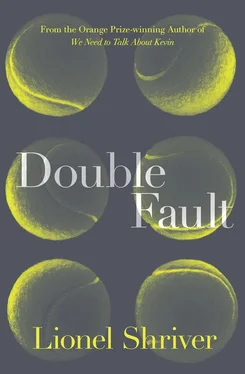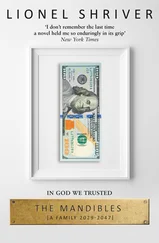
The Borough Press
An imprint of HarperCollins Publishers
1 London Bridge Street
London SE1 9GF
www.harpercollins.co.uk
Published by HarperCollins Publishers 2017
First published by HarperCollins Publishers 2017
Copyright © Lionel Shriver 1997
Cover design by Stuart Bache © HarperCollins Publishers Ltd 2017
Cover photographs © Shutterstock.com
Lionel Shriver asserts the moral right to be identified as the author of this work
A catalogue record for this book is available from the British Library
This novel is entirely a work of fiction. The names, characters and incidents portrayed in it are the work of the author’s imagination. Any resemblance to actual persons, living or dead, events or localities is entirely coincidental.
All rights reserved under International and Pan-American Copyright Conventions. By payment of the required fees, you have been granted the non-exclusive, non-transferable right to access and read the text of this e-book on-screen. No part of this text may be reproduced, transmitted, down-loaded, decompiled, reverse engineered, or stored in or introduced into any information storage and retrieval system, in any form or by any means, whether electronic or mechanical, now known or hereinafter invented, without the express written permission of HarperCollins e-books
Source ISBN: 9780008209773
Ebook Edition © June 2017 ISBN: 9780008209780
Version: 2017-04-06
‘A brilliant tale of doomed love’
Observer
‘The scenes between Willy and Eric are terrific pieces of writing: the dialogue crackles with rage, frustration and bitterness’
Independent
‘That Shriver refuses to avert her gaze, much less sweeten the pill, is what makes her such an interesting writer. She does not coax, or wheedle: she challenges. She makes you think’
Daily Telegraph
‘Shriver is a truly remarkable star in the literary firmament. She has an uncanny sense of the way women subject themselves to secret, inward torture, weighing themselves down with passionate feelings they believe socially unacceptable to bring out in the open … I doubt there is any thoughtful woman who does not recognise herself somewhere in Shriver’s writing’
LISA JARDINE, Financial Times
‘The characters and situations are utterly convincing and the level of detail in the narrative provides a ghastly gossipy pleasure’
LESLEY GLAISTER
‘Shriver doesn’t care whether her characters are likeable or not: they play off one another’s strengths and weaknesses in a mesmerizing grudge match’
Saga
‘With prose as taut as a well-strung racquet, you’ll be captivated’
Marie Claire
‘Her writing is as precise and devastating as a Federer forehand’
Belfast Telegraph
‘When feminism has become the politics that dare not speak its name, it is refreshing to find an author who will bring such renewed vigour to the gender wars’
Guardian
‘Her exploration of her characters is so fearless that although readers may not sympathise with her, they’ll understand why she’s driven to destroy what she loves’
Metro
To Jonathan
Whose real name I may use so rarely to save it for special occasions.
Dedicated in the fervent hope that we will confine this plot to paper.
‘Rarely do you get something if you want it too much.
There isn’t a tennis player in the world who
can’t tell when an opponent is frightened.’
TED TINLING
Cover
Title Page
Copyright
Praise
Dedication
Epigraph
Author’s Note
chapter 1
chapter 2
chapter 3
chapter 4
chapter 5
chapter 6
chapter 7
chapter 8
chapter 9
chapter 10
chapter 11
chapter 12
chapter 13
chapter 14
chapter 15
chapter 16
chapter 17
chapter 18
chapter 19
chapter 20
chapter 21
chapter 22
About the Book
About the Author
Also by Lionel Shriver
About the Publisher
In the interests of storytelling, the tennis ranking system has been simplified in this novel. Readers curious about the complexities of national versus international rankings, or the WTA versus Virginia Slims computers, should consult the copious nonfiction on the subject. A few additional liberties have been taken, for Double Fault is not so much about tennis as marriage, a slightly different sport.
At the top of the toss, the ball paused, weightless. Willy’s arm dangled slack behind her back. The serve was into the sun, which at its apex the tennis ball perfectly eclipsed. A corona blazed on the ball’s circumference, etching a ring on Willy’s retina that would blind-spot the rest of the point.
Thwack . Little matter, about the sun. The serve sang down the middle and sped, unmolested, to ching into a diamond of the chain-link fence. Randy wrestled with the Penn-4. It gave him something to do.
Willy blinked. “Never look at the sun” had been a running admonition in her childhood. Typical, from her parents: avert your eyes from glory, shy from the bright and molten, as if you might melt.
A rustle of leaves drew Willy’s gaze outside the fence to her left. Because the ball’s flaming corona was still burned into her vision, the stranger’s face, when she found it, was surrounded by a purple ring, as if circled for her inspection with a violet marker. His fingers hooked the galvanized wire. He had predatory eyes and a bent smile of unnerving patience, like a lazy lion who would wait all day in the shade for supper to walk by. Though his hairline was receding, the lanky man was young, yet still too white to be one of the boys from nearby Harlem scavenging strays for stickball. He must have been searching the underbrush for his own errant ball; he had stopped to watch her play.
Willy gentled her next serve to Randy’s forehand. There was no purpose to a pick-up game in Riverside Park if she aced away the entire set. Reining in her strokes, Willy caressed the ball while Randy walloped it. As ever, she marveled at the way her feet made dozens of infinitesimal adjustments of their own accord. Enjoying the spontaneous conversation of comment and reply, Willy was disappointed when her loping backhand tempted Randy to show off. Ppfft , into the net.
This late in the first set, she often gave a game away to keep the opposition pumped. But with that stranger still ogling their match from the woods, Willy resisted charity. And she wasn’t sure how much more of this Randy Ravioli (or whatever, something Italian) she could take. He never shut up. “ Ran-dee! ” echoed across all ten courts when his shot popped wide. Between points Randy counseled regulars in adjoining games: “Bit too wristy, Bobby old boy!” and “Bend those knees, Alicia!” Willy herself he commended: “You pack quite a punch for a little lady.” And the stocky hacker was a treasure trove of helpful advice; he’d demonstrated the western grip on the first changeover.
Читать дальше














